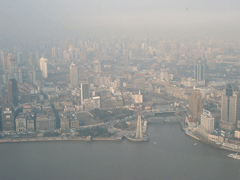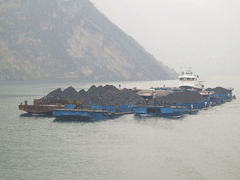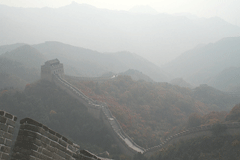Chinese Coal Rush
Air Date: Week of August 3, 2007

View of Shanghai under a cloud of air pollution. (Photo: sabershadezero)
The U.S. coal market is slowing down in the face of impending federal regulation of carbon dioxide, but construction of coal-fired power plants in other parts of the world is moving full steam ahead. Chinese banks now fund the construction of as many as two or more new coal plants each week. Host Steve Curwood talks with Orville Schell, director of the Center on U.S. China Relations at the Asia Society, about China's growing energy market.
Transcript
CURWOOD: While concern about the future costs of carbon emissions is putting the squeeze on the largely private investment in coal in America, things are different in China. There, in the face of local power shortages, regional government banks are funding as many as two or more new coal fired plants every week. These local funding authorities seem to be little concerned about climate change, although the estimated 750,000 deaths linked each year to coal pollution have touched off some protests. Trevor Houser is an energy expert with the China Strategic Advisory group. He says restrictions on household savings are driving this construction boom in coal plants.
HOUSER: Chinese citizens can’t invest money outside of the country, they can only invest money in domestic assets, so their options are fairly limited in what they can invest and the majority of them put their money into the banks.
CURWOOD: Those banks, in turn says Trevor Houser, favor heavy industries - cement, aluminum and steel –industries that are heavy users of electricity.

Coal barges make their way up China’s Yangtze River. (Photo: wjpbennett)
HOUSER: That bias is in part due to the lack of a credit system so that state owned banks are a little scared to lend out to 1,000 small private textile companies when they can lend the same amount to three big state owned steal mills that they know they can get the investment back from.
CURWOOD: That was Trevor Houser of the China Strategic Advisory Group. Orville Schell recently returned from China. He’s the Director of the Center on U.S. China Relations at the Asia Society. Mr. Schell says that the Chinese Central government is having a hard time reigning in the construction of coal plants in the provinces.
SCHELL: Unlike our own country, the central government in China and Beijing has become quite enlightened and quite alarmed by what they’ve learned about the effects of coal, of industrialization both in terms of conventional pollutants and climate change. But at the local level down at the provinces, counties and municipalities where economic decisions are made, and where the careers of officials are judged by the economic progress that they catalyze. It is very difficult for these central government policies to be effectively carried out in terms of environmental standards being maintained on new factories so you get this sort of insurgent proliferation of power plants that are financed by local banks for whom the land has been given by local governments and deals in which the officials are in league with each other and getting pay offs to build them. So, the central government has a very hard time patrolling what goes on out in the provinces.

Pollution from Beijing mutes the air around the Great Wall of China. (Photo: vicky tricky)
CURWOOD: Now, I imagine that the average person out on the street in China isn’t all that worried about climate change but is pretty bothered by the air pollution, the environmental quality that coal degrades for him or her. How much are Chinese citizens responding to the challenge of pollution from coal?
SCHELL: Yeah, it’s very interesting. Environmental problems are causing people great anxiety. And in an increasing number of cases leading to demonstrations, protest, and sometimes violent confrontation with authorities. There was a case about five weeks ago in Fujian in Xiamen on the coast where a paraxylene factory was scheduled to built and through the technological advancement of cell phone communications people started text messaging all over the city and tens of thousands of people poured out into the street to protest against it. This is very alarming to the government. And there have been other cases where land is confiscated from peasants for power plants. Rivers have been terminally polluted with industrial effluent. Lead smelteries have been belching toxic smoke out over a rural area where people have actually risen up and fought with guns and weapons and people have been killed. So, the government now sees that this is not a problem that they can simply kind of ignore. It is something that has grave consequences not only for social instability but for the health of the nation and also for the economy because it is estimated, and you see the most wildly diverging estimates but I’ve seen estimates from 3 to 10 percent of GNP as the cost of the environmental degradation caused by this rapid industrialization.

View of Shanghai under a cloud of air pollution.(Photo: sabershadezero)
CURWOOD: So, China is committed to moving its people ahead. And the one resource it really has is coal. It seems like there’s a collision really being set up: China’s desire to move forward and its use of a substance which is already choking itself and could end up helping to choke the entire planet. How do you get out of this box?
SCHELL: Well, I think the only way to get out of it, if you look at this in bilateral terms is for China and the U.S. to both acknowledge that there is a huge problem. It isn’t helpful for the U.S .to say “It’s China’s problem and China’s responsibility” or for China to say the same about the U.S. Why? Because their problem is our problem. Their pollutants are our pollutants. Their addition of greenhouse gasses to the atmosphere detracts from our account and our wellbeing. So, we have no choice it seems to me but to get together to remedy this. Something we’ve not really done at least not in as substantial a way as I believe we should do. And I think we need to bring Japan into this. Why Japan? Because they have capitol, they have technology and they have in fact cleaned up their environment. They have a lot of experience. We need a major new initiative between the U.S. and China that stops blaming each other, that starts allotting a new kind of responsibility for the remedy or we’re never going to get on top of it.
CURWOOD: Orville Schell is Director of the Center for U.S. China relations for the Asian Society in New York. Thank you so much sir.
SCHELL: Pleasure.
CURWOOD: To listen to other parts of our series “Generating Controversy: The Changing Climate of Coal,” go to our website: loe(dot)org
[MUSIC: Peter Gabriel “Digging in the Dirt (instrumental)”’Real World’ (Peter Gabriel Ltd – 1992)]
Links
Living on Earth wants to hear from you!
Living on Earth
62 Calef Highway, Suite 212
Lee, NH 03861
Telephone: 617-287-4121
E-mail: comments@loe.org
Newsletter [Click here]
Donate to Living on Earth!
Living on Earth is an independent media program and relies entirely on contributions from listeners and institutions supporting public service. Please donate now to preserve an independent environmental voice.
NewsletterLiving on Earth offers a weekly delivery of the show's rundown to your mailbox. Sign up for our newsletter today!
 Sailors For The Sea: Be the change you want to sea.
Sailors For The Sea: Be the change you want to sea.
 The Grantham Foundation for the Protection of the Environment: Committed to protecting and improving the health of the global environment.
The Grantham Foundation for the Protection of the Environment: Committed to protecting and improving the health of the global environment.
 Contribute to Living on Earth and receive, as our gift to you, an archival print of one of Mark Seth Lender's extraordinary wildlife photographs. Follow the link to see Mark's current collection of photographs.
Contribute to Living on Earth and receive, as our gift to you, an archival print of one of Mark Seth Lender's extraordinary wildlife photographs. Follow the link to see Mark's current collection of photographs.
 Buy a signed copy of Mark Seth Lender's book Smeagull the Seagull & support Living on Earth
Buy a signed copy of Mark Seth Lender's book Smeagull the Seagull & support Living on Earth

